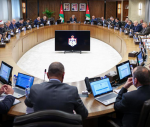You are here
Sudan's Bashir gets two years' detention for corruption
By AFP - Dec 15,2019 - Last updated at Dec 15,2019
KHARTOUM — Sudan's former president Omar Al Bashir was sentenced Saturday to two years' detention in a correctional centre for corruption in the first of several cases against the ousted leader.
The charges stemmed from millions of dollars received by the toppled strongman from Saudi Arabia.
Bashir, who was deposed by the army in April after months of mass protests against his three-decade rule, appeared in court in a metal cage wearing a traditional white jalabiya and turban for the verdict.
He was convicted of "corruption" and "possession of foreign currency", judge Al Sadiq Abdelrahman said, charges which can carry a prison sentence of up to 10 years.
Instead the court, taking into account his age, ordered the 75-year-old to serve two years in a correctional centre for the elderly.
"Under the law, those who reached the age of 70 shall not serve jail terms," the judge said.
Bashir will serve his sentence after the verdict has been reached in another case in which he is accused of ordering the killing of demonstrators during the protests that led to his ouster, the judge said.
The court also ordered the confiscation of 6.9 million euros, $351,770 and 5.7 million Sudanese pounds ($128,000) found at Bashir’s home.
The ex-president will appeal the verdict, said one of his lawyers, Ahmed Ibrahim.
Outside the court, several dozen Bashir supporters gathered chanting: “There is no god but God.”
Hundreds more holding banners reading “Down, down the government” marched in central Khartoum where there was a heavy security presence.
Sudan is now ruled by a joint civilian and military sovereign council, which is tasked with overseeing a transition to civilian rule.
The authorities announced Saturday the dissolution of professional organisations put in place under Bashir — one of the demands of the protest movement that unseated him.
Saudi ‘donations’
Bashir admitted to having received a total of $90 million from Saudi leaders and the trial centred on the $25 million received from Saudi Arabia’s de facto ruler Crown Prince Mohammed bin Salman.
Bashir said the money seized from his home came out of the $25 million.
The funds, he said, formed part of Sudan’s strategic relations with Saudi Arabia and were “not used for private interests but as donations”.
Bashir’s lawyer Mohamed Al Hassan had said before the verdict that the ex-president’s defence did not see the trial as a legal case, but as a “political” one.
The trial does not relate to charges Bashir faces at the International Criminal Court (ICC) for genocide, war crimes and crimes against humanity.
Bashir has been wanted by the ICC for years for his role in the Darfur war that broke out in 2003, when ethnic minority rebels took up arms against his Arab-dominated government which they accused of marginalising the region.
Human rights groups say Khartoum targeted suspected pro-rebel ethnic groups with a scorched earth policy, raping, killing, looting and burning villages.
The Darfur conflict left around 300,000 people dead and 2.5 million displaced, according to the United Nations.
After Bashir was toppled, ICC prosecutors requested he stand trial for the killings in Darfur.
Army generals who initially seized power after the president’s fall refused to hand him over.
But Sudan’s umbrella protest movement, which now has significant representation on a sovereign council that in August became the country’s highest executive authority — recently said it has no objection to his extradition.
Separately, on November 12, Sudanese authorities filed charges against Bashir and some of his aides for “plotting” the 1989 coup that brought him to power.
In May, Sudan’s attorney general said Bashir had been charged with the deaths of those killed during the anti-regime demonstrations that led to his ouster, without specifying when he would face trial.
Related Articles
KHARTOUM — A former Sudanese official accused of atrocities in the Darfur region has announced that he would prefer to stand trial before th
KHARTOUM — The trial of Sudan’s ousted president Omar Al Bashir and others over a 1989 coup heard defence arguments on Tuesday dismissing ch
KHARTOUM — The verdict in the corruption trial of Sudan’s ousted president Omar Al Bashir is to be delivered on December 14, a judge an

















